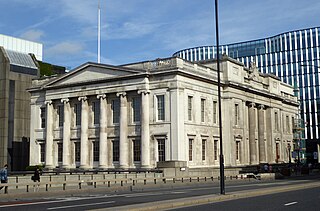
His Majesty's Prison Belmarsh is a Category A men's prison in Thamesmead, southeast London, England. The prison is used for high-profile cases, particularly those concerning national security. Within the grounds is the High Security Unit (HSU), which consists of 48 single cells. It is run by His Majesty's Prison Service. The prison has been called "Britain's Guantanamo Bay" due to the long-term detention of terrorism suspects without charge. Belmarsh is also notoriously known as "Hellmarsh" due to the fact that Belmarsh is considered the toughest prison in the UK and due to the high number of physical and authority abuses reported by both the prison's inmates and by human rights activists.
Terrorism in Australia deals with terrorist acts in Australia as well as steps taken by the Australian government to counter the threat of terrorism. In 2004 the Australian government has identified transnational terrorism as also a threat to Australia and to Australian citizens overseas. Australia has experienced acts of modern terrorism since the 1960s, while the federal parliament, since the 1970s, has enacted legislation seeking to target terrorism.

Islamic terrorism in Europe has been carried out by the Islamic State (ISIL) or Al-Qaeda as well as Islamist lone wolves since the late 20th century. Europol, which releases the annual EU Terrorism Situation and Trend report (TE-SAT), used the term "Islamist terrorism" in the years 2006–2010, "religiously inspired terrorism" 2011–2014, and has used "jihadist terrorism" since 2015. Europol defines jihadism as "a violent ideology exploiting traditional Islamic concepts".
On 5 October 2016, three police officers were attacked by a man wielding a machete in the Schaerbeek municipality of Brussels, Belgium. Two of them suffered stab wounds, while the third was physically assaulted but otherwise uninjured. The suspected assailant, a Belgian citizen named Hicham Diop, was apprehended and charged with attempted terrorism-related murder and participating in a terrorist group.

On 22 March 2017, a terrorist attack took place outside the Palace of Westminster in London, seat of the British Parliament. Khalid Masood, a 52-year-old Briton, drove a car into pedestrians on the pavement along the south side of Westminster Bridge and Bridge Street, injuring more than 50 people, four of them fatally. He then crashed the car into the perimeter fence of the palace grounds and ran into New Palace Yard, where he fatally stabbed an unarmed police officer. He was then shot by an armed police officer, and died at the scene.
The 2017 Jerusalem Light Rail stabbing was a stabbing attack and suspected act of terrorism that occurred on Good Friday, 14 April 2017, on Jerusalem Light Rail's car. In the attack, a 20 year old British student was stabbed to death by Jamil Tamimi, a Palestinian man. Two others, including a pregnant woman, were injured in the incident. The attacker was arrested and was deemed competent to stand trial.

On 3 June 2017, a terrorist vehicle-ramming and stabbing took place in London, England. A van was deliberately driven into pedestrians on London Bridge, and then crashed on Borough High Street, just south of the River Thames. The van's three occupants then ran to the nearby Borough Market area and began stabbing people in and around restaurants and pubs. They were shot dead by Metropolitan Police and City of London Police authorised firearms officers, and were found to be wearing fake explosive vests. Eight people were killed and 48 were injured, including members of the public and four unarmed police officers who attempted to stop the assailants. British authorities described the perpetrators as "radical Islamist terrorists".

On 29 May 2018, Benjamin Herman, a prisoner on temporary leave from prison, stabbed two female police officers, took their guns, shot and killed them and a civilian in Liège, Belgium. The gunman took a woman hostage before he was killed by police. The attacker had since 2017 been suspected of having been radicalised in prison after converting to Islam, and was reported to be part of the entourage of a prison Islamist recruiter. The method of the attack was said by investigators to match and be specifically encouraged by the Islamic State which claimed the attack. Prosecutors say they are treating the attacks as "terrorist murder". The attack is treated as "jihadist terrorism" by Europol.
Events from 2020 in England

On 29 November 2019, five people were stabbed, two fatally, in Central London. The attacker, Usman Khan, had been released from prison in 2018 on licence after serving a sentence for terrorist offences.

Usman Khan, also known as Abu Saif, was an Islamic terrorist of Pakistani-British nationality who, in 2012, received a conviction for planning a terrorist attack. On 29 November 2019, following a knife attack near London Bridge that resulted in two deaths and three injuries, Khan was fatally shot by City of London Police after being subdued by civilians.

The Terrorist Offenders Act 2020 is an act of the Parliament of the United Kingdom that makes legal provision for ending the practice of releasing individuals convicted of terrorism offences from prison after they have served half of their custodial sentence. The original bill was introduced on 11 February 2020, a week after the Streatham stabbing in south London, the perpetrator of which had been released from prison ten days before the incident. The legislation applies to those convicted of terrorism offences in England, Scotland and Wales. On 12 February the Bill cleared all of the stages required for it to pass through the House of Commons, doing so without the need for a vote. On 26 February the act received assent and went into effect, immediately preventing the automatic release of 50 convicted terrorists.

On 20 June 2020, shortly before 19:00 BST, a man with a knife attacked people who were socialising in Forbury Gardens, Reading, Berkshire, United Kingdom. Three men died from their wounds, and three other people were seriously injured. A 25-year-old Libyan male refugee named Khairi Saadallah was arrested nearby shortly afterwards. Saadallah was a former member of the Libyan militant group Ansar al-Sharia. He was charged with three counts of murder and three counts of attempted murder; he pleaded guilty. In January 2021, Saadallah was sentenced to a whole-life term.

On 26 June 2020, a mass stabbing attack took place in the Park Inn Hotel, Glasgow, Scotland. Six people, including a police officer, were seriously injured. The attacker, Badreddin Abadlla Adam, was shot dead by police at the scene.

On 3 September 2021 at 14:40 NZST, eight people were injured in a mass stabbing at the LynnMall Countdown supermarket in New Lynn, Auckland, New Zealand. The attacker, Ahamed Samsudeen, was being followed by police officers, who intervened during the attack and shot and killed him after he charged the officers. He was pronounced dead at the scene. The incident was treated as terrorism and was "ISIS-inspired" according to Prime Minister Jacinda Ardern. It was the second stabbing in less than four months to occur at a Countdown supermarket, the first being in Dunedin, and the first terrorist attack in New Zealand since the Christchurch mosque shootings in 2019.
On March 22, 2022, four people were killed and two more were injured during a stabbing and vehicle-ramming attack by an Islamic State supporter in Beersheba, Israel.
This is a timeline of ISIL-related events that occurred in the year 2020.















